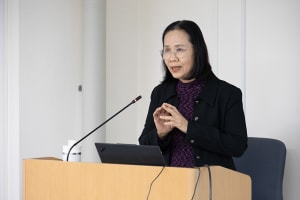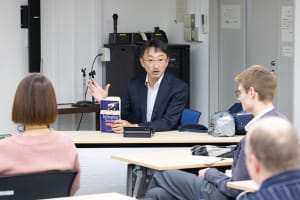Report
On November 22, 2025, from 14.00, the Tobunken Seminar titled “Modern Uniform, Medieval Mindset: Feudal Culture and the Thai Military's Business Empire” was held and presented by Puangthong Pawakapan, from Chulalongkorn University and currently a visiting professor at Institute for Studies on Asia.
In this presentation, Professor Puangthong revealed a detailed analysis into the Thai military's business operation, which was characterized by neo-feudalism, privilege, and institutional resistance to scrutiny. The military, particularly the Army, consistently refused to provide complete financial reports, justifying its lack of transparency and accountability by claiming "unparalleled sacrifices for the nation" and invoking "national security." The core issue is the military's decentralized "separate power, separate wealth" structure, where its five major branches operate as independent business kingdoms without central financial oversight. This structure, reminiscent of the historical sakdina system, frustrates civilian checks and balances, allowing elites to accrue wealth and enjoy impunity within their fiefdoms.
The military maintains an extensive commercial portfolio, frequently violating state land and welfare regulations. As the largest holder of state land, the military diverts vast resources for non-military commercial purposes and elite leisure, such as 61 golf courses. Furthermore, the military exploits the annual cohort of conscripts, treating them as "free labor" or subjects for business operations and as servants for generals, a practice that undermines its own narrative of national unity. Professor Puangthong concluded that this culture, placing loyalty outside the constitution and the people, poses a significant obstacle to both military reform, professionalism and democratization.
Event Details
Date and Time: Thursday, November 20, 2025, 14:00 – 16:00 (Japan Time)
Venue: Main Conference Room, 3F, Institute for Advanced Studies on Asia, The University of Tokyo, and Online (Zoom)
Speaker: Puangthong R. Pawakapan (Department of International Relations, Chulalongkorn University; Visiting Professor at Institute for Advanced Studies on Asia, University of Tokyo)
Title: Modern Uniform, Medieval Mindset: Feudal Culture and the Thai Military's Business Empire
Chair/Commentator: Jin Sato (Professor, Institute for Advanced Studies on Asia, The University of Tokyo)
Language: English
Abstract
With numerous coups and long periods of direct rule, the Thai military's power is deeply embedded in the infrastructure of the state and complex royalist networks. While security studies explain military power through the framework of civil-military relations, many authoritarian regimes do not adhere to such Western notions of civilian supremacy. They operate on their own distinct concepts of power and professionalism.
This paper argues that the Thai military has been profoundly shaped by Thai feudal, or sakdina, culture, which fundamentally underpins its internal power relations and defines its duties. This patrimonial sakdina ethos is most evident in the business operations of the various armed forces branches. Much like feudal lords, they exploit state land and manpower under their possession. Violations of rules and acts of self-enrichment are often met with a self-righteous sense of entitlement to privilege and immunity from accountability.
This military's neo-feudal system is made possible by its omnipotent power in Thai politics. Focusing specifically on its business operations, I contend that the sakdina concept illuminates the Thai military's politico-economic culture with exceptional clarity. A nuanced understanding of this medieval ethos operating within the modern Thai military is essential for anyone seeking to advance meaningful and lasting military reform.




